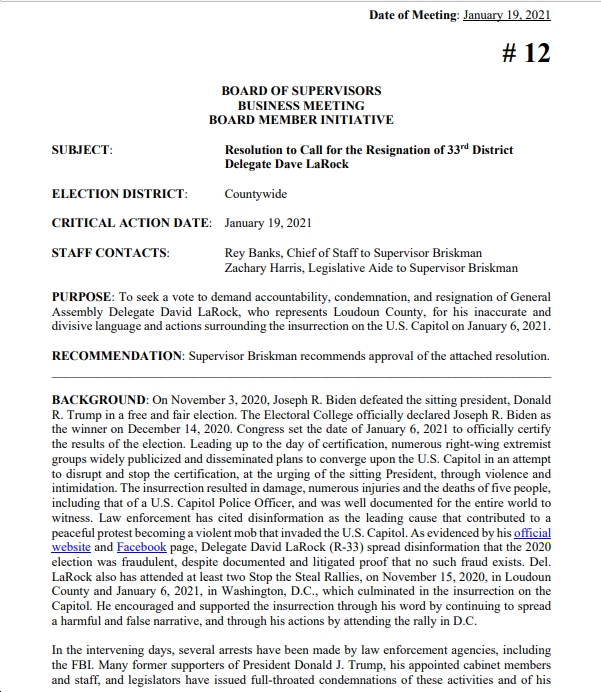By Jeff Thomas

Make no mistake about it: Dominion is facing the most serious crisis in its 110-year history. How they respond – and how readers of Blue Virginia respond – will chart the destiny not just of that company, but of Virginia politics and government for the next half-decade.
Alan Suderman reports that “Lawmakers, lobbyists and others at the General Assembly say there’s been a noticeable change in attitude toward the company this year compared to three years ago, when Dominion had little trouble passing legislation that has yielded a significant windfall for the company. ‘It was considered suicide to even speak against Dominion,’ said Sen. Chap Petersen, a Democrat who added that he recently received a standing ovation at a town hall when he previewed a bill to ban public service corporations like electric utilities from making political contributions. ‘First time in 21 years of public service.’” For another metric of the schism Dominion’s abuses of power have fomented within the establishment, a groundbreaking series in the Richmond Times-Dispatch in late 2017 accurately described the machinations of the most powerful and corrupt corporation in Virginia – a report that would have been inconceivable just a few hagiographic years ago.
Briefly, Dominion consists of a socialist electric company held within a parent natural gas corporation subservient to Wall Street. Socialist Dominion, in which the corrupt government forces more than two million Virginians to buy electricity from Dominion and only Dominion, is guaranteed a rate of return by the government (9.6% in recent years). Other ventures receive higher rates of return: with the Atlantic Coast Pipeline, Wall Street Dominion may charge its captive Socialist Dominion customers up to a 14% return. Despite these guaranteed profits, Dominion stock has far underperformed the S&P 500 over the past five years. Wall Street Dominion would fail without the never-ending bailout from Socialist Dominion.
Socialist monopolies are antithetical to capitalism and democracy, so to maintain this favored position, Dominion’s essential business model is to bribe legislators. Thus, politicians who refuse to take money from Dominion are an existential threat to Dominion’s business model. Without campaign contributions, Dominion would be a ripe target for politically popular refunds that would boost the economy and turn out votes as effectively as any tax cut. Dominion understands the logic of refunds – for South Carolinians, to whom Dominion has promised refunds of $1,000 as a sugar high to sweeten its much more profitable takeover of SCANA.
Politicians that Dominion needs are awakening to the political potency of opposing the state’s most corrupt, anti-capitalist corporation. Tom Perriello’s populist gubernatorial campaign was the first indication of trouble for Dominion, and the elections of thirteen House of Delegates candidates who refused to take money from Dominion was a watershed. The disastrous pipelines and the heroic resistance of ordinary people like Red and Minor Terry could not have come at a worse time for Dominion. Taking people’s land is extremely unpopular, so anti-pipeline platforms are political winners, and as long as Donald Trump remains in office, we will continue to have blue waves. Both the state Senate and House of Delegates are likely to flip to Democratic control next year. While awaiting the wave, things have gotten even worse for Dominion: nominees for Congress from both parties have refused to take its money. Not only do they not need the money, politicians have figured out that refusing it earns them votes. Lots of votes.
- First District: Democratic nominee Vangie Williams
- Second District: Democratic nominee Elaine Luria
- Third District: (Rep. Scott, incumbent)
- Fourth District: (Rep. McEachin, incumbent)
- Fifth District:
- Republican nominee Denver Riggleman became involved in state politics after part of his property would have been bulldozed for the Atlantic Coast Pipeline. When he withdrew from the gubernatorial race last year, current Republican Senate nominee Corey Stewart noted: “Denver’s fight against Dominion Power was spot on, as his effort was primarily driven by his distaste for Dominion Power’s strong control over Richmond.”
- Democratic nominee Leslie Cockburn
- Sixth District: Democratic nominee Jennifer Lewis has refused all fossil fuel money and is the nation’s leading anti-pipeline candidate.
- Seventh District: Democratic nominee Abigail Spanberger has refused money from all corporate PACs.
- Eighth District: (Rep. Beyer, incumbent)
- Ninth District: Democratic nominee Anthony Flaccavenco
- Tenth District: Democratic nominee Jennifer Wexton
- Eleventh District: (Rep. Connolly, incumbent)
Vote counters have realized that, if and when it’s put to the legislature after the 2019 blue wave, the Democratic Party will overwhelmingly support Chap Petersen’s bill to ban Dominion’s bribes. Even more striking is that Riggleman and Stewart are canaries in the coal mine that indicate not only Democrats but also the Tea Party would be likely to vote to prohibit campaign contributions from socialist organizations. Furthermore, a major donor has pledged to support those who take the politically popular position of standing up to Dominion. It’s a win-win for both populist and establishment politicians.
To fight the crisis of democracy, Dominion has taken to sloppy electoral and PR strategies. First was a thinly-veiled and heavily-lawyered letter from Dominion CEO and Paul Manafort body double Tom Farrell to employees and shareholders asking them to “take time to review the candidates’ positions and see how they stand on critical projects such as the Atlantic Coast Pipeline,” “exercise your constitutional right to vote,” etc. Then, the company changed its logo from something that “look[ed] like the hand of Michelangelo’s Adam receiving life from God” to something more like postmodern Adidas/Tesla.
Just last week, Dominion hired away the Richmond Times-Dispatch’s editorialist Bart Hinkle, who began his new venture untroubled by the irony of going to work for a government monopoly he had for decades railed against in principle, if not in practice. It would be more effective as a pure PR move to continue to have Hinkle pump out his faux libertarian sophistry than it would be for his independence to be forever suspect when Dominion is paying his salary. Plus, Dominion doesn’t need the help: any Blue Virginia reader could regurgitate the drivel from Dominion hacks like David Botkins. The point of hiring Hinkle is to demonstrate to other reporters that they will be rewarded after a long career of toeing the company’s line, like a reportorial revolving door.
The insurance policy to these embarrassing strategies is that there’s still a bipartisan consensus favoring aristocratic graft, personified in the Senate’s geriatric grandees who have not yet faced the blue wave. As Minority Leader Dick Saslaw said: “Go ask Dominion, go ask any of these companies – beer and wine wholesalers, banks, the development community – every one of them will tell you, they will tell you I’m the most pro-business senator,” while Senate Majority Leader Tommy Norment pretends to reverse roles and simply has sex with a lobbyist as he sponsors her bills.
I’ve never understood how a political class that loudly proclaims their “pro-business” credentials can simultaneously vote to raise electricity rates on businesses. The 2015 rate hike bill has already taken hundreds of millions of dollars out of the pockets of business and residential customers over and above the extremely generous, guaranteed rate of return. The reason for this seeming discrepancy is campaign contributions: Dominion is the largest donor in Virginia; therefore, they write the state’s energy policies.
Dominion is facing a crisis of democracy whose end game is impossible to predict. We should expect a more sophisticated backlash, and the corrupt system may continue onward for some time by inertia alone. Socialist Dominion, the one dependent on bribing corrupt legislators, may sue for peace and return some of the money to those it has been ripping off for as long as anyone can remember. This would not just improve the prospects for millions of people, thousands of businesses, and large sections of the economy, but it would also preempt those who understand that the root of Dominion’s power is money in politics. Reining in these campaign contributions would cut off the head of the snake of a Virginia Way ideology that corrupts the aristocrats – those who have always held the power in Virginia – so that all sectors of our government can begin to reflect a more pro-people and pro-business ideology. The ultimate nightmare for Dominion, of course, is that the co-opted politicians who have done its bidding since time immemorial come to understand that Dominion’s self-interest in raising electricity rates is bad for business – or come to be outnumbered by politicians who do.
***
Jeff Thomas is the author of Virginia Politics & Government in a New Century: The Price of Power.




![Video: A “Shaken” Sen. Mark Warner “Pray[s]” We Won’t Have American “Boots on the Ground” in Iran; Says “we didn’t have to be here”](https://bluevirginia.us/wp-content/uploads/2026/03/warnershaken-350x250.jpg)
![Wednesday News: “The Grand Opening of an American Concentration Camp”; Trump Threatens to Arrest Mamdani; “Poorest Americans Would Be Hurt By Trump’s Big Bill”; [VA] GOP nominees share stage, but not unity”; “Hoos your daddy, Virginia?” (Not Youngkin)](https://bluevirginia.us/wp-content/uploads/2025/07/montage0702.jpg)











